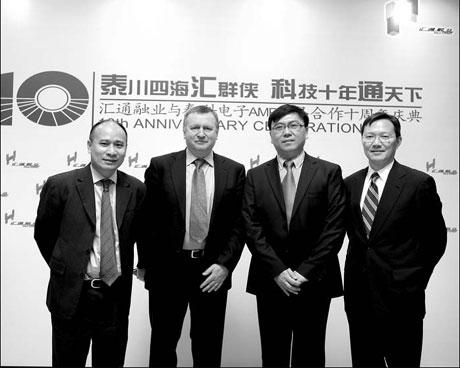
Company representatives present at the 10th anniversary business meeting of Tyco Electronics and the Beijing HuiTong Data Co Ltd. From left: Neville Lai, regional business director of Tyco Electronics' enterprise networks business unit; Alan Clarke, president of Tyco Electronics' network solutions segment; Sun Kaihua, executive director of Beijing HuiTong Data Co Ltd; and Gordon Hwang, senior vice-president of Tyco Electronics, China. [China Daily]
Tyco Electronics Ltd, a global provider of electronic components and network solutions, which recently acquired ADC, a cable and wireless device supplier, is looking to expand its product range.
Tyco Electronics had sales of $12.1 billion in more than 150 countries and regions for fiscal 2010. It produces a broad array of goods for the automotive, consumer electronics, telecommunications, aerospace, and lighting fields.
The company has some 78,000 employees worldwide, including 7,000 engineers.
ADC's products "complement Tyco Electronics' products," explained Alan Clarke, president of Tyco Electronics's network solutions segment.
"The combination of the two sets of products, with their strength in geography, makes us a very strong competitor and supplier."
Clarke said he believes Tyco Electronics's market opportunities will be extended, because it will be able to go to the large telecom operators.
"We can go to customers in China Telecom or Deutsche Telekom and offer them one-stop shopping in fiber cable accessories, copper cable accessories and wireless products."
Growth in China
Tyco Electronics came to China more than 20 years ago and opened its first factory here in 1989. Today it has 16 factories, 14 sales offices, and around 37,000 employees.
"China is very important to us. We see that we've grown well in China. It's key to our company's growth strategy," said Clarke.
China is not only a manufacturing base for Tyco Electronics, but a place that supports its business in other parts of the world.
With its R&D team in Shanghai designing products for the telecom business, "it's not just about bringing technology to China to develop the market here. It's really using the China market and skills they (Clarke's team) can find here to grow their business worldwide," explained Gordon Hwang, senior vice-president of Tyco Electronics, China.
Tyco Electronics has a "few partners, tight relationships" strategy in China, because "the issue isn't about having partners," said Clarke.
"The issue is, you have to win projects. If you have three or four partners all fighting for the same project, then you tend to have a lot of problems in the market. It really is quite inefficient."
The HuiTong Data Co Ltd, a network designer and installer, has been one of Tyco Electronics's China partners for 10 years.
"HuiTong has been a very good and loyal partner," said Clarke. "We believe the relationships that we created with a limited number of partners serve us better. They're going out and having many partners across the whole country."
Ambitious target
Tyco Electronics has an ambitious China plan to grow at three times the rate of the GDP. The network solution team will focus on fiber networks for broadband access, wireless coverage, and data centers in the coming years.
"If you consider Western Europe and America, they're starting a fiber optic rollout to subscribers. But, in China, it hasn't really started yet.
"Everybody wants high speed and high-definition video in their house. Wireless won't do it in the end. We have to run fiber optic closer to everybody's home," he explained. "So, over a period of time, there will be a large fiber optic rollout," Clarke said.
With the ADC acquisition, Tyco Electronics has become a major supplier of fiber optic rollout, he noted.
A product developed by ADC called distributed antenna systems (DAS) allows greater coverage and capacity for wireless connectivity.
"If you think about going to a football stadium, where you have 70,000 people with iPhones and things like that, you need very large coverage, much better coverage than you have today. Everybody expects to be able to read football results from all the teams," Clarke commented. "The DAS system will enhance coverage."
In China's data center and large building cabling markets, he said he believes there is a "considerable matter of growth".
Clarke said that Tyco Electronics' biggest challenge in the post-crisis era is to stay ahead in technology.
"It's all about technology for companies like us. You see huge changes in technology, and we have to stay ahead of that.
"We supply components in smart phones. These phones have a life of one year and then we redesign it. So, the challenge for us is to be able to change quickly technologically."
The company is undergoing a leaning process, focusing on efficiency and low waste to improve product research and development. It is putting 5 percent of its revenues back into R&D.





